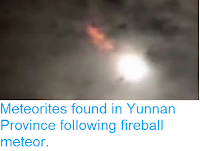The Delta Aquarid Meteor Shower peaks each year on 27-28 July, when the
shower can produce 10-20 meteors per hour. Best viewing this year is
predicted to be between midnight and 2.00 am (this will be in local time
wherever they are viewed from, as the time reflects the orientation of
the planet to the rest of the Solar System), when the radiant point of
the shower (point from which the meteors appear to radiate), which is
close to the star Delta Aquari (hence the name) will be highest in the
sky. This coincides with a Full Moon, which would normally be considered bad for viewing, but that evening will also see a full Lunar Eclipse, so the shower might prove interesting.
The radiant point of the Delta Aquarid Meteors (i.e. the point from which they appear to radiate). EarthSky.
The Delta Aquarids are thought to be caused by the Earth passing through the trail of Comet 96P/Machholz, where it encounters thousands of tiny dust particles
shed from the comet as its icy surface is melted (strictly sublimated)
by the heat of the Sun. 96P/Machholz is a short period, Jupiter Family Comet, crossing our orbit every 5.24 years, but the
trail of particles shed by it forms a constant flow,
See also...
Follow Sciency Thoughts on Facebook.







